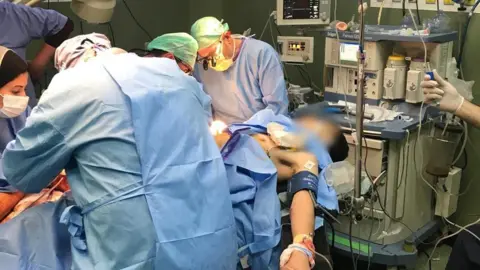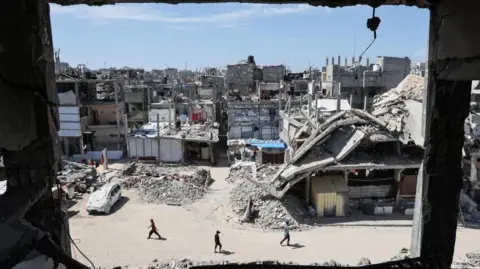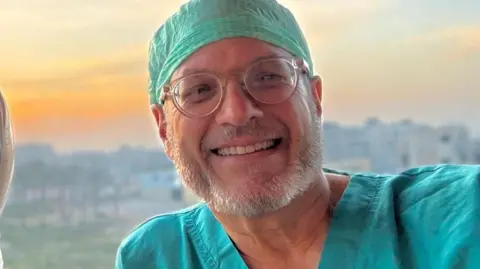BBC Middle East analyst
 Dr Mark Perlmutter
Dr Mark PerlmutterWarning: This article contains details that some readers may find distressing
An American surgeon who’s been working in two Gaza hospitals for the past three weeks has said that wounded Palestinian patients have died because of the lack of equipment and supplies.
Dr Mark Perlmutter says that doctors have had to work in operating rooms without soap, antibiotics or x-ray facilities, as Israel has resumed its offensive against Hamas in Gaza.
A 15-year-old girl who was hit by Israeli machine gun fire while riding her bicycle was one of the many wounded children that Dr Perlmutter said he had to operate on.
The Israeli government has said the renewed attacks that its military is carrying out in Gaza are aimed at forcing Hamas to release all the remaining hostages.
Dr Perlmutter spoke to the BBC shortly after the end of his second trip to Gaza – the first one was around a year ago. Critical of Israel’s conduct in the Strip, he has previously called for an arms embargo and said its attacks on Gaza constitute genocide, which Israel vehemently denies.
This time, he worked in Al-Aqsa hospital in Deir al-Balah in the centre of the territory and then in Nasser hospital in the south of Gaza.
He has been working for Humanity Auxilium in Gaza as part of a wider World Health Organization (WHO) programme.
He was in Nasser hospital when it was hit by an Israeli air strike, targeting Ismail Barhoum, the Hamas finance chief.
Hamas said that Barhoum was being treated for injuries that he suffered in an earlier Israeli attack. The Israeli military denied this, saying he was in the hospital “in order to commit acts of terrorism”.
Dr Perlmutter has told the BBC that Barhoum was in the hospital to receive further medical treatment. He says that as a patient in hospital, Barhoum had a right to be protected under the Geneva Convention.
The human cost of the latest Israeli offensive was exemplified for Dr Perlmutter by two 15-year-olds – including the girl on the bicycle – who were brought into the operating room in each of the hospitals he was working in, a week apart.
“They were both macerated and shredded by Apache gunships,” Dr Perlmutter says.
The girl will, in his words, “be lucky if she keeps three of her limbs”.
Dr Perlmutter says that people at the scene told the ambulance crew who brought the young girl into the hospital that she was hit by gunfire from an Israeli military helicopter.
He says that she had been riding her bicycle by herself and she arrived at the hospital without a backpack or anything else that might have aroused suspicion. Graphic images from the operating table show catastrophic wounds to her leg and arm.
The boy was driving in a car with his grandmother after receiving warnings to evacuate from the north, Dr Perlmutter says.
“Then the car was attacked by two Apache gunships. The grandmother was shredded at the scene and died,” he said.
“The boy came in without a foot on his right side, the vascular repair on his left side took five hours – the nerve repair on his left side failed and he had a blackened hand the next day that required amputation at the level of his elbow – his left leg will require multiple surgeries for reconstruction and he has a chest wound. He may not have survived.”
Dr Perlmutter has also provided graphic photos of the boy’s wounds.
In a statement, the Israel Defense Forces (IDF) said it “does not target uninvolved individuals.”
“The IDF operates in accordance with international law, targeting only military objectives while taking feasible measures to mitigate harm to civilians,” it told the BBC.
The statement also said that the IDF had not been provided with “sufficient information” to directly address the incidents that Dr Perlmutter described.
“The IDF takes action to address irregular incidents that deviate from its orders. The IDF examines such incidents and takes appropriate measures where justified,” it said.
 Reuters
ReutersUnder such conditions, Dr Perlmutter stressed the commitment and dedication of the Palestinian medical staff – above and beyond the efforts of foreign doctors like himself.
“The stress levels on us are not even approachable to what happens even to the Palestinian medical students that work with us, whose stress levels are insane, as with the nurses and the techs in the operating room, let alone the Palestinian surgeons,” he said.
“They all abandon their families, they volunteer and often work without pay. They work the same hours that we do – and we get to go home in a month, which they don’t. They still have to return to the squalor of their tents where there’s often 50 people living in a tent built for 20 – and sharing one toilet.”
Most hospitals across Gaza are out of operation or barely managing to function. Dr Perlmutter compared the medical facilities in Gaza to where he lives in North Carolina. There are multiple trauma centres there, but they would have been overwhelmed, he says, if they had to deal with the mass influx of casualties that resulted from the first day of Israel’s resumption of its war against Hamas.
“The small community hospital, Al-Aqsa, is a tenth the size of any of the facilities in my home state – maybe smaller – and it did well to manage those horrible injuries – nevertheless, because of lack of equipment, many, many of those patients died, who would certainly not have died at a better equipped hospital,” he said.
 Supplied
SuppliedOn Saturday the UN’s humanitarian chief Tom Fletcher described the current situation in Gaza as dire.
“All entry points into Gaza are closed for cargo since early March. At the border, food is rotting, medicine expiring and vital medical equipment is stuck,” he said.
“If the basic principles of humanitarian law still count, the international community must act to uphold them.”
On 2 March the Israeli government closed border crossings with Gaza and halted humanitarian aid. It said this was in response to what it called the refusal by Hamas of a new US proposal to extend the first stage of the ceasefire and hostage release deal, rather than negotiating a second phase.
“When Israel resumed its attacks, it was almost identical to when they bombed incessantly when I was here a year ago,” Dr Perlmutter says. “The only difference is now instead of bombing people in buildings, they were bombing people in tents.”
The Israeli army has regularly claimed that Hamas operates from areas where civilians are taking shelter. It says that it does not target civilians and takes measures to avoid civilian casualties.
The International Criminal Court last year issued arrest warrants for Israeli Prime Minister Benjamin Netanyahu and former defence minister Yoav Gallant over alleged war crimes, saying it found reasonable grounds to believe that “each bear criminal responsibility… for the war crime of intentionally directing an attack against the civilian population”. They deny this.
Israeli attacks have killed more than 15,000 Palestinian children in Gaza, the Hamas-run health ministry has reported.
And since the IDF broke a ceasefire and resumed its strikes on 18 March, 921 Palestinians have been killed, the ministry said.
Dr Perlmutter warns that if there are more mass casualty events in Gaza from Israeli attacks, the lack of supplies in the two hospitals he’s been working in means that more Palestinians will die from wounds that could have been treated.









